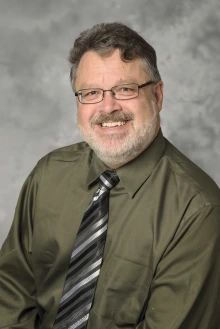Jerome F. Koleski honored with global family medicine award
Jerome F. Koleski, MD, an associate clinical professor in the Department of Family and Community Medicine at the University of Arizona College of Medicine – Tucson and co-director of Global Health Programs in the Office of Global and Border Health, has received the 2025 Gabriel Smilkstein Award.
The honor recognizes outstanding contributions to the growth and development of family medicine education around the world. It was presented to Koleski, also co-director of the Global Health Track for the Family Medicine Residency, during the annual Global Health Educators Collaborative meeting at the Society of Teachers of Family Medicine spring conference May 6 in Salt Lake City.

Jerome Koleski, MD
Photo courtesy of Jerome Koleski, MD
Koleski, who volunteers his time at local free clinics and travels to Kenya yearly with medical students, said he was honored to receive an award named for a physician who feels the same way he does about what makes a great doctor.
He said people often share this quote from Smilkstein: “One of my colleagues asked if I was lying in the emergency room critically ill, would I prefer a doctor with technical excellence or one who was compassionate and caring? I replied, ‘Neither. Why should a patient need to choose? A competent physician must be both.’”
Koleski, a former Peace Corps volunteer, has long cared for patients stateside and abroad, working in Ecuador as well as in HIV/AIDS care in Lilongwe, Malawi, in East Africa. He’s taught medical and nursing students from around the world.
“What changes can be the diseases, the diagnostic equipment and labs, and the treatment options,” Koleski said. “What doesn’t change is caring, communicating and the community of a health care team.”
In her nomination letter, Sommer Aldulaimi, MD, co-director of Global Health Programs and a professor at the College of Medicine – Tucson, said her longtime colleague is as passionate about teaching students as he is about his patients. She first met Koleski when she was a resident.
“He has been responsible for many medical students finding their passion in family medicine and choosing it as a specialty,” she wrote.
Koleski goes the extra mile on a regular basis, Aldulaimi said.
“Not only does he take incredible care of patients while they are in clinic or at the hospital, I have witnessed Dr. Koleski going above and beyond to help his patients, even after hours,” she wrote. “I have seen him at social events calling in a stat prescription for a patient or on the phone with a patient reassuring them about bad news or lab results.
“You would be hard-pressed to find another human being who has dedicated as much of his life to caring for underserved and vulnerable patients in resource-limited areas and teaching family medicine residents globally as Dr. Koleski. He is an example to faculty such as myself of how to care for and teach in global settings.”
Koleski said, “I tell students that there is no point in cheating to pass an exam because each time you walk into a room, a clinic exam room, an ED bay or an operating room, there is a three-question test that is always the same: 1. Do you know what is wrong with me? 2. Can you fix it? 3. Do you care? If you don’t care, you can only score 67%, which is a failing grade.
“I’m most proud of showing young doctors with great hearts how to be better doctors, how to know what is wrong, and how to fix what is wrong or find someone who can fix the problem. There are multiple ways to care and show the patient and family that they care. I’m really proud of spreading family medicine, caring for the whole person and family, to distant parts of the world. I think every health care system needs family medicine as its health care base.”

